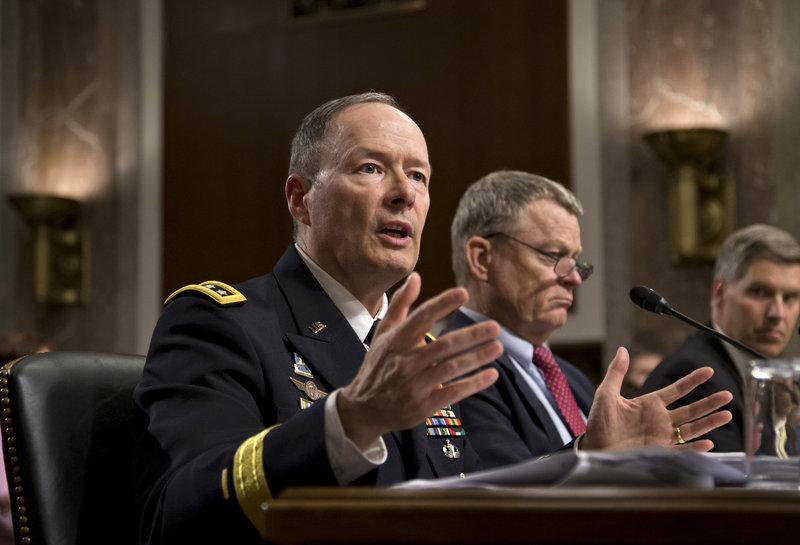– The Washington Post
WASHINGTON – The head of the National Security Agency defended his agency’s broad electronic surveillance programs Wednesday, saying that they have helped thwart dozens of terrorist attacks and that their recent public disclosure has done “grave harm” to the nation’s security.
Facing his first public grilling since it was revealed that the NSA has collected millions of telephone records and emails in secret, Gen. Keith Alexander sought to aggressively rebut congressional and other criticism of the Obama administration’s anti-terrorism tactics.
He said the surveillance programs were critical to unraveling terrorist plots at home and abroad. In particular, he cited the cases of Najibullah Zazi, an Afghan-American who pleaded guilty to planning suicide attacks in New York, and David Headley, a Pakistani-American who acknowledged conspiring in the 2008 attacks in Mumbai in which 172 people died. Six victims were Americans.
“I think what we’re doing to protect American citizens here is the right thing,” Alexander said under sometimes hostile questioning before the Senate Appropriations Committee. “Our agency takes great pride in protecting this nation and our civil liberties and privacy.”
Alexander’s appearance featured the unusual spectacle of the head of the ultra-secretive NSA publicly discussing highly classified programs as the administration is pursuing possible criminal charges against a former NSA contractor who says he leaked the details of those efforts.
Alexander’s words reflected the intense debate consuming Washington since last week’s revelations that the government has been collecting the call records of millions of Americans and scooping up email and other user records of foreign terrorism suspects from nine leading technology companies, including Google, Facebook and Microsoft.
The confessed leaker, Edward Snowden, 29, surfaced publicly again Wednesday, saying that the U.S. has mounted massive hacking operations against hundreds of Chinese targets since 2009 as part of a global campaign. Snowden, in an interview in Hong Kong, vowed to fight the U.S. government in the courts if it attempts to extradite and prosecute him.
U.S. officials said criminal charges are being prepared against Snowden. The officials spoke on the condition of anonymity about ongoing efforts.
The Obama administration has defended its extensive surveillance, and President Obama has said he welcomes a public debate about the programs. Alexander followed up on that pledge Wednesday, vowing to quickly make public data showing the phone program has prevented attacks.
“Over the next week, it will be our intent to get those figures out. … I want the American people to know we’re being transparent here,” he said.
The phone-records program, disclosed last week by Britain’s Guardian newspaper, collects customer “metadata,” including the phone numbers dialed and the length of calls — and, senators said, location data, which intelligence analysts use to detect patterns and personal connections. The administration said that the program does not monitor the content of calls and that it has been reviewed by the courts and Congress.
A separate Internet surveillance program, known as PRISM, allows the NSA to collect videos, photos, emails, documents and connection logs for foreign users located overseas through nine leading Internet companies. The government obtains the data through orders approved by the secret court established by the Foreign Intelligence Surveillance Act. That program was disclosed by The Washington Post and the Guardian.
Alexander appeared at a hearing to discuss cybersecurity spending, but some committee members took the opportunity to question him about the surveillance programs.
The four-star Army general said the leaks have hurt national security. But he said it is important to allay concerns that the surveillance was exceeding constitutional bounds.
“Grave harm has already been done by opening this up,” he said. “There is no doubt in my mind that we will lose capabilities as a result of this, and that not only the United States but those allies that we would help will no longer be as safe as they were two weeks ago.”
Send questions/comments to the editors.



Success. Please wait for the page to reload. If the page does not reload within 5 seconds, please refresh the page.
Enter your email and password to access comments.
Hi, to comment on stories you must . This profile is in addition to your subscription and website login.
Already have a commenting profile? .
Invalid username/password.
Please check your email to confirm and complete your registration.
Only subscribers are eligible to post comments. Please subscribe or login first for digital access. Here’s why.
Use the form below to reset your password. When you've submitted your account email, we will send an email with a reset code.